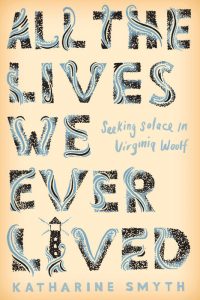
An elegant memoir of the unbreakable bond between a daughter and her father using literary scholarship (Rhode Island, Boston, also England, Australia; roughly 1980s to present-day): There are many ways to describe this heartbreaker of a memoir about an only child who loses her beloved yet enigmatic, alcoholic father.
Katharine Smyth misses her father terribly, yearns to better understand him, which means reconciling conflicted memories of him. She wants to see him in the best light – Light a constant thread – not through a child’s adoring eyes (“a child [who] danced on the top of his feet”), but as an adult often disappointed and disgusted by his “recklessness.”
Smyth’s father remains nameless until the acknowledgements, a nod to the mystery of him. He died at 55 to cancer, hastened (if not brought on) by self-destructive behaviors. Truth is, and Smyth writes candidly, she’d been losing him many years before.
How can someone go from “the most gentle and loving being” to an unrecognizable “brutish stranger”? Be so “anti-life” yet “hold such life within”? What happened to the man who seemed happy when they sailed and swam together? Once so energetic, so full of life, then so full of “exhaustion and sourness.” If, as the author concludes, he was “born an alcoholic,” was he ever truly happy? Happy enough? What was the meaning of his life?
Smyth has been struggling with these complicated questions for at least the past ten years, which is how long she says she’s been writing about him. Seems much longer, going back to when she was eleven when she started a diary. Even with all those years of reflections, her impressions of him keep shape-shifting. Understandable, as he was complex, a nasty drunk, and her mother was private and distant, silent and absent during all those troubling years.
This testament to a daughter’s unbreakable attachment to and love for her father is profound. Her teenage years were emotional roller coasters as she (and her mother) walked on eggshells, so erratic and unpredictable was he. Yet she, not her mother, was his primary caretaker (minus the years she was sent to boarding school, a godsend). Not a slight matter as her father underwent frequent cancer treatments, sometimes every three months, in and out of hospitals. When the disease spread, his last hospitalization was lengthy, torturous. “How can people be asked to endure this?” asks the daughter who never left her father’s side.
Smyth seeks existential answers from Virginia Woolf, her literary idol, who counsels “life is infinitely beautiful yet repulsive.” As the subtitle suggests, the author applies Woolf’s early 20th century inner thoughts (from letters, essays, diaries) and fiction to 21st century loneliness and grief to enlighten her. Perhaps Woolf is right: you can never truly know someone. But the beautiful thing about the author’s impressive effort is not wanting to accept the darker view. In elegant prose, she strives to find the light.
Where better than in Woolf’s To The Lighthouse, which as far as the author is concerned “tells the story of everything.” This is the book she holds dear above all books. (“Perhaps there is one book for every life.”) Even if you haven’t read it or remember it, the author shows how relatable it is to her life starting with a favored parent (the mother, Mrs. Ramsey) at the heart of a family and a marriage.
Woolf spent her childhood in a house by the sea and the light (“the purest ecstasy I can conceive”) in Cornwall, England with a view of the Godrevy Lighthouse, where she summered as a child. (Fictionally, she moved the house, sea, and light to the Isle of Skye in Scotland.)

Photo by Steve Fareham via Geograph
Virginia Woolf’s real and fictionalized homes remind the author of an 1890s house with a waterfront deck in Rhode Island she spent happy summers. The Cornwall home was “the most important of all memories,” wrote Woolf. True for Smyth and once upon a time for her father.
The author knows Virginia Woolf intimately; she’s the subject of her master’s thesis. (Her father was also from England; the author studied at Oxford and fondly recollects those days.) Other Woolf writings (and biographer analyses) are sometimes blended in, all often within the same paragraph. Stylistically, the memoir reflects some of Woolf’s stream-of-consciousness modernism, including use of Woolf’s bracketed parenthetical thoughts. So there’s plenty of literary food for thought.
We can also examine the memoir psychologically, as this is a sad story about what happens to a person’s psyche when they become unemployed and it drags on and on. The author’s father never really made a comeback from a creatively satisfying architectural career (her mother also an architect) when he lost that job to the recession in the ‘80s. A tragic example of how job loss can spiral downward triggering heavy, constant drinking (and smoking).
Another psychological factor is the extent to which the “unique psychology of sickness” (Woolf’s prophetic words, having committed suicide) fueled her father’s depression and alcoholism, a toxic mix coupled with the psychological damage caused by joblessness.
Alcoholism affects the whole family. The memoir, then, is a window into the perniciousness of alcoholism victimizing a family, eating away at a marriage. (Though theirs didn’t end in divorce, a topic of consternation since the author’s marriage dissolved after four years.). The family goes on, but not without considerable sacrifices. “Marriage is a loss, a sacrifice of self and its expression,” says the author reflecting Woolf’s feminism.
All the Lives We Ever Lived raises many provocative issues, including a different perspective to consider only children other than the typical stereotype of spoiled brats.
The question of whether a child loves their father or mother more comes up. Let’s accept the question is a universal one owing to human nature and circumstances. The question that’s not universal is why an only child might have a more intense obsession for one parent over another? Adoration so acute and vital it becomes wrapped up in a fear life will become unbearable when that parent dies.
Only children like the author may carry a melancholy “sense of envy” of larger families, a kind of grief on its own for not being part of the “happy chaos of siblings” as seen in Woolf’s Ramsey family. Feelings of existential longing are practical too: not having a sister or a brother to comfort you, especially when you have to carry the burden of a dysfunctional family. Fiction, then, is not just for entertainment, escape, but to gain insight into ourselves by letting us inside how others live, act, and think.
The author also does us a service when she’s hit by how different her emotions are from societal expectations of grieving. She describes grief as “dreaminess,” “alienation,” “fogginess,” “formlessness.” But what she discovers is that for her it’s not the non-stop crying and falling-apart she dreaded for so many precious years.
Most remarkable is the lack of bitterness in the prose. Perhaps, in part, because the author’s idol shunned “sentimentality.” But we need to let Smyth shine here all on her own, admire her optimism to find her father’s lost light – “that astonishing light” – not just for the memory of him but for herself.
Tenderly and compassionately the author writes about wildlife by the water – great blue herons and swan egrets and creatures of the sea like starfish, oysters, horseshoe crabs. Poignantly observing species disappearing year after year, the prose cries out on climate change and how much Nature nourishes our well-being.
Ironically, in writing to better know her father, the author found a brighter light for her mother, for whom she dedicates her eloquent memoir to.
Lorraine
I appreciate your review. I have been interested in this book
Hope you enjoy, Nancy, as it’s beautifully written and thoughtful. Appreciate your comment.
Terrific review, Lorraine! I hadn’t heard of this memoir and you’ve made it sound so poignant and engaging. I’m adding it to my list.
Thanks, Jackie. Means a lot coming from you. Oh, that ever growing list!
I love Virginia Woolf’s prose and ideas and after your review, I’m heading “To the Lighthouse”. And would like to read Smyth’s book as well since I know she’s quite a good writer. Thanks Lorraine. I love these reviews.
Barton
Hi Barton — What a lovely surprise! I think it would be ideal to read one book right after the other but Smyth’s memoir reads beautifully as a stand-alone. Another book on the same grieving-your-father-theme through classics is by Rachel Cohen, Austen Years: A Memoir in 5 Novels. It works best if you’ve read a few or all of Jane Austen’s works when they’re fresh in your mind as her references are more detailed. I noted that in the review, but the writing and ideas are also engaging so you can still glean a lot. Delighted you found the blog and appreciate your commenting. Lorraine